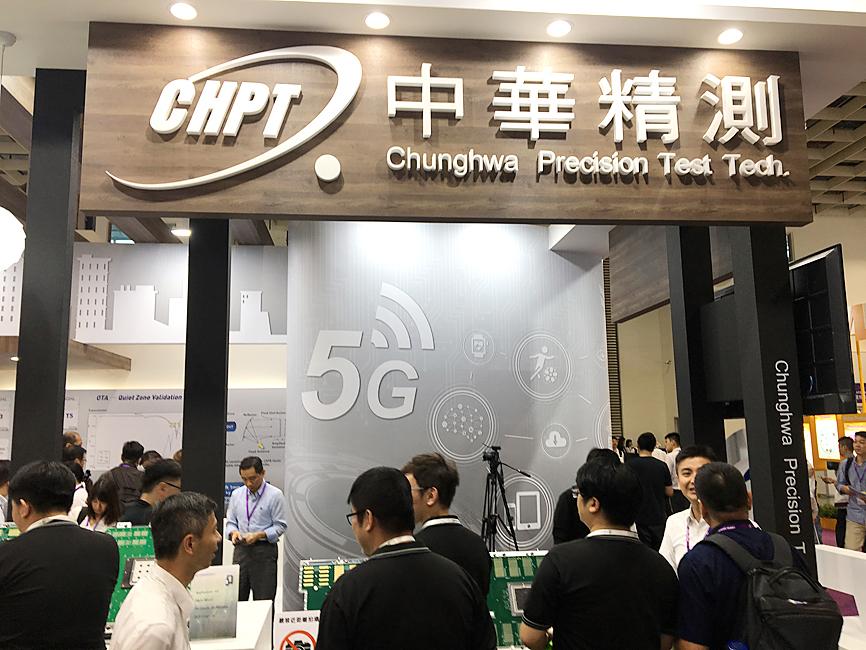Wafer probing service provider Chunghwa Precision Test Technology Co (CHPT, 中華精測) expects revenue to grow quarterly for the remainder of the year, as it is well-positioned to benefit from the robust demand for processors used in 5G smartphones and high-performance computing devices such as data centers.
The growth momentum was disrupted last quarter as CHPT’s engineers were prohibited from visiting customers’ factories for product qualification after the government raised the COVID-19 alert in May to level 3 to curb infections, the company said yesterday.
As the government eased some restrictions this week, the company expects to regain momentum from next month, as 5G-related infrastructure deployment, electric vehicles and remote work continue to stimulate demand.

Photo: CNA
“The COVID-19 outbreak has upended the normal seasonal patterns this year,” CHPT president Scott Huang (黃水可) told an online investors’ conference in Taipei. “The second and third quarters used to be the best quarters for the company. This year, each quarter would be higher than the previous one, probably making the fourth quarter the best quarter of the year.”
For the full year, revenue is expected to surpass last year’s NT$4.23 billion (US$151 million), thanks to growing demand for its wafer probe card business, Huang said.
The outlook for next year is positive, he added.
The company’s top client is expected to contribute more than 30 percent to its total revenue this year, filling the void left by two of its major customers last year, he said.
The wafer probe card business accounted for 35 percent of the company’s overall revenue last quarter, down from 41 percent the previous quarter due to COVID-19 restrictions, the Pingjhen District (平鎮), Taoyuan-based company said.
Net profit contracted 7.3 percent to NT$216 million last quarter from NT$233 million a year earlier, but rose 28.57 percent from NT$168 million in the previous quarter, it said.
Earnings per share dropped to NT$6.16, compared with NT$7.11 a year earlier and NT$5.11 in the first quarter.
Net profit in the first half of the year was NT$384 million, it said.
Gross margin fell to 53.8 percent last quarter from 54.1 percent in the first quarter and 54.1 percent in the second quarter last year.

NEW IDENTITY: Known for its software, India has expanded into hardware, with its semiconductor industry growing from US$38bn in 2023 to US$45bn to US$50bn India on Saturday inaugurated its first semiconductor assembly and test facility, a milestone in the government’s push to reduce dependence on foreign chipmakers and stake a claim in a sector dominated by China. Indian Prime Minister Narendra Modi opened US firm Micron Technology Inc’s semiconductor assembly, test and packaging unit in his home state of Gujarat, hailing the “dawn of a new era” for India’s technology ambitions. “When young Indians look back in the future, they will see this decade as the turning point in our tech future,” Modi told the event, which was broadcast on his YouTube channel. The plant would convert

‘SEISMIC SHIFT’: The researcher forecast there would be about 1.1 billion mobile shipments this year, down from 1.26 billion the prior year and erasing years of gains The global smartphone market is expected to contract 12.9 percent this year due to the unprecedented memorychip shortage, marking “a crisis like no other,” researcher International Data Corp (IDC) said. The new forecast, a dramatic revision down from earlier estimates, gives the latest accounting of the ongoing memory crunch that is affecting every corner of the electronics industry. The demand for advanced memory to power artificial intelligence (AI) tasks has drained global supply until well into next year and jeopardizes the business model of many smartphone makers. IDC forecast about 1.1 billion mobile shipments this year, down from 1.26 billion the prior

People stand in a Pokemon store in Tokyo on Thursday. One of the world highest-grossing franchises is celebrated its 30th anniversary yesterday.

Zimbabwe’s ban on raw lithium exports is forcing Chinese miners to rethink their strategy, speeding up plans to process the metal locally instead of shipping it to China’s vast rechargeable battery industry. The country is Africa’s largest lithium producer and has one of the world’s largest reserves, according to the US Geological Survey (USGS). Zimbabwe already banned the export of lithium ore in 2022 and last year announced it would halt exports of lithium concentrates from January next year. However, on Wednesday it imposed the ban with immediate effect, leaving unclear what the lithium mining sector would do in the